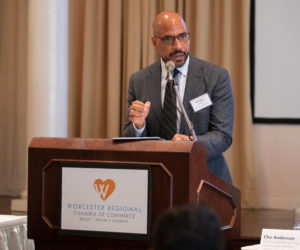The business of pot is hot. When Clark University and the Worcester Regional Chamber of Commerce co-sponsored a panel discussion on the emerging cannabis industry in Massachusetts last November, interest was so great they relocated to a larger venue to accommodate the nearly 200 attendees.
In the end, discussion of the historic legalization of cannabis in the Commonwealth of Massachusetts took place in a historic setting – Mechanics Hall.
Since voters in the 2016 state election passed a ballot petition to legalize adult use of marijuana, both state and local governments have grappled with the implications for health care, public safety, social service agencies, and employers.
In that time, the state’s Cannabis Control Commission established regulations detailing the licensing, production, and sale of marijuana, but each town has developed its own host agreement for those businesses.
“Municipal officials were seeking policy guidelines,” said John LaBrie, dean of the School of Professional Studies and associate provost for graduate education at Clark University. In late 2018, many local leaders felt unprepared for this new retail market in what remains a controlled substance that, with overuse, presents health and safety challenges similar to those of alcohol and prescription drugs.
The dean’s faculty colleagues engaged in conversations on ways to extend the school’s public policy programs to meet the needs of these towns – traditional employers of its graduate students.
“People are struggling with” cannabis legalization as a public policy issue, said Mr. LaBrie.
With a longstanding master of public administration graduate program, Clark sees its role as an education institution to equip people to tackle such issues and, in June 2019, the school announced the creation of a new graduate certificate in regulatory affairs for cannabis control – the first in the nation and completely online.
“We didn’t set out to be innovators,” said Mr. LaBrie, but the school did meet demand from an underserved market. Ten other states have legalized marijuana in recent years and more than 20 now permit its sale for medicinal purposes. Therein, policies and regulations vary widely. Currently, the only regulatory-focused program in the country, Clark’s online course structure enables enrollment on a national scale.
The program’s first semester began in September with fewer than 20 students yet another dozen joined the program in January. Classes include students from several New England and western states plus Hawaii. Mr. LaBrie expects to see the first graduates from the program matriculate in May.
Initial course evaluations from the fall reveal “students are really happy,” he reports.
Another joyous development for those who work as municipal or state employees is Clark’s November announcement of a tuition waiver – essentially making the graduate certificate free to those intent on understanding the cannabis-related policy issues they encounter in their work.
“We wanted to make our program as accessible as possible to that population,” said the dean. Although students are still responsible for certain fees, the waiver program began with the January semester.
The program encompasses three seven-week online courses, examining how educational and enforcement policies are implemented, today’s legal and regulatory framework, and best practices to minimize potentially negative effects of cannabis on public health and safety.
The courses are taught, and were developed by, a team of practitioners with local expertise, including academicians, police, and legislators.
Allison Chisolm is a correspondent for The Chamber Exchange. If you have any questions, please contact Emily Gowdey-Backus via email.





